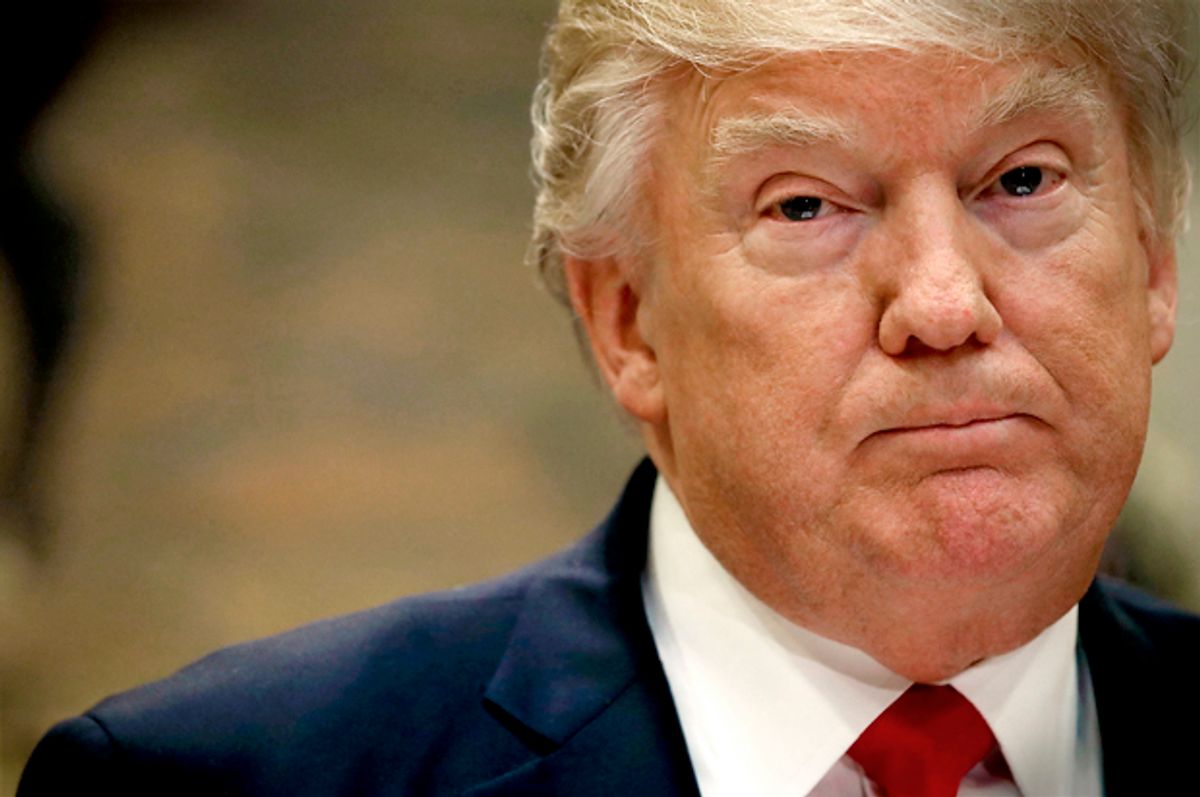How is the White House still so bad at managing a crisis? Has the staff not yet had enough practice?
In retrospect, we all should have expected some act of self-sabotage from President Donald Trump this week. It is a long-standing pattern of his to follow up a victory by shooting himself in both feet. You would think members of his staff would be able to anticipate — if not the exact crisis bearing down upon them, at least the fact that there would be one — and make adjustments accordingly.
It was exactly a week ago that the president stood in the Rose Garden with much of the House Republican caucus to celebrate the House's passage of the Affordable Health Care Act. Sure, that was a little premature, since the bill still has to go to the Senate and a conference committee. And sure, the bill’s effects on the nation’s populace could be welcomed only by the Republicans who passed it and sociopaths who revel in human misery. But I repeat myself.
And yet, the first attempt at passage of such legislation in March had very publicly fallen short, in a humiliating defeat for Trump and House Speaker Paul Ryan. It called into question Ryan’s ability to lead his caucus and pass major legislation and Trump’s supposedly legendary skills as a salesman who can make killer deals.
The second effort worked partly because Trump supposedly became more involved in twisting the arms of reluctant members of the House. The bill's passage was the fulfillment of years of promises by the House Republicans and a pledge that Trump himself had made over and over to repeal Obamacare during his campaign.
That was Thursday. On Friday Trump flew to his golf club in Bedminster, New Jersey. There, according to The New York Times, he spent time grumbling over then-FBI Director James Comey’s congressional testimony the day before the AHCA vote. Comey, among other things, proclaimed himself as being “mildly nauseous” at the thought that his actions last year in the investigation of Hillary Clinton’s use of an unauthorized email server might have thrown the election to Trump.
Trump’s agitation reportedly grew while watching the Sunday talk shows' discussions of Comey’s testimony. By the time he flew back to Washington, according to the Times, he had made up his mind to fire the director. In true Trumpian fashion, the whole operation was so haphazard and ill-conceived that the president may have created a whole host of new and potentially presidency-destroying legal problems for himself.
This pattern of self-sabotage manifested itself throughout the campaign and the first months of Trump’s presidency. There was his angry defense of his campaign’s use of anti-Semitic imagery, which took some heat and press attention off Clinton the day after Comey’s infamous press conference announcing the end of the FBI investigation of her email server. There was his feud with the family of a Muslim soldier killed in Iraq, which came just after he had accepted the Republican nomination at the party’s convention.
Trump has been no better in office, despite his promises to be more “presidential.” In January, for instance, he stepped on the celebration of his inauguration by obsessing about the size of the crowd attending it. He demanded that his press secretary, the hapless Sean Spicer, harangue and bully White House reporters over their accurate reporting, thus opening a rift with the press corps on his second day in office while making his childish complaints the story.
These meltdowns all have two things in common. They all involve lashing out over some perceived slight that wounds Trump’s bottomless ego, and they all come immediately after he has achieved a victory. In this case, he might have even made it harder to follow up on his AHCA victory: It's possible that the Democrats’ threats to slow down the Senate's business until an independent counsel is appointed to investigate Trump’s Russia ties will result in the chamber’s Republicans being unable to pass their own health care bill.
Other reporting over the last couple of days has painted a picture of a president isolated in the White House, frustrated over his stumbles and yelling at his TV whenever someone on it talks about the probe of his campaign’s ties to Russia. (Which I guess, since Trump doesn’t drink, is his version of Nixon drunkenly rambling to the presidential portraits on the White House walls.) Combine that with his scattershot and mercurial management style and you have a recipe for repeating crises.
Trump's staff cannot anticipate the exact nature of each crisis. But by this point, assuming they are not all blithering idiots (and I would not take that bet), they should at least be able to recognize the pattern and prepare themselves — before the president decides to blow up something more than an FBI director’s career.



Shares